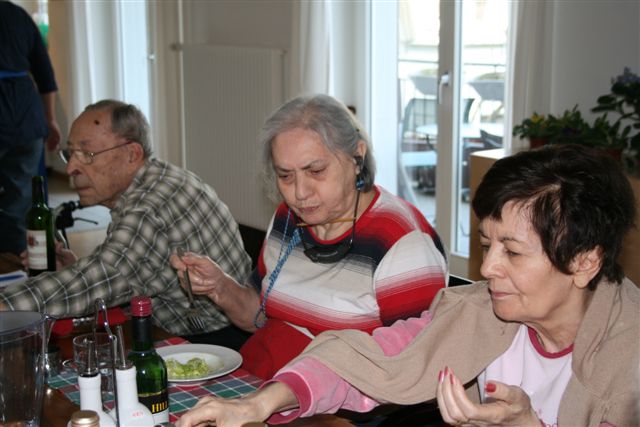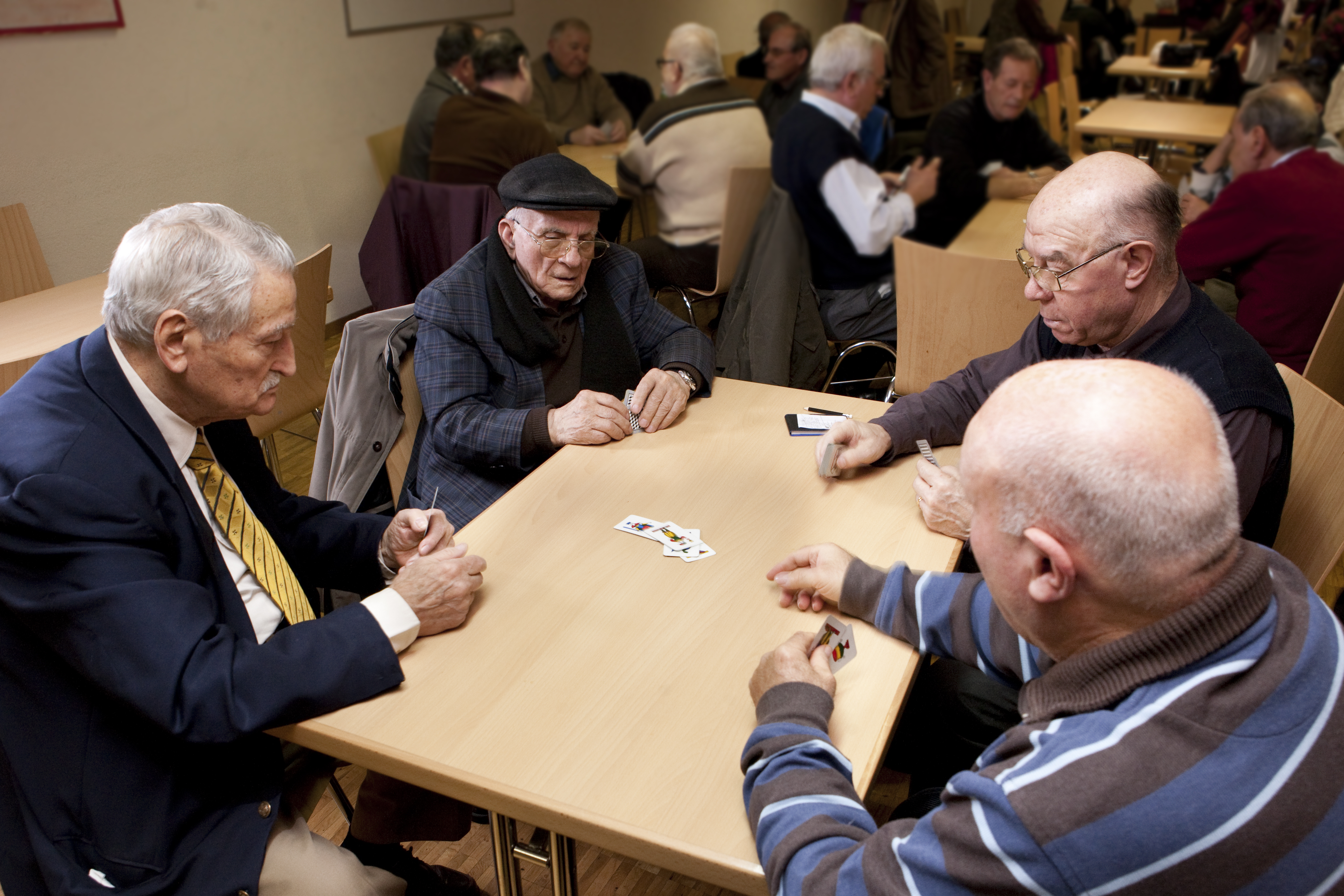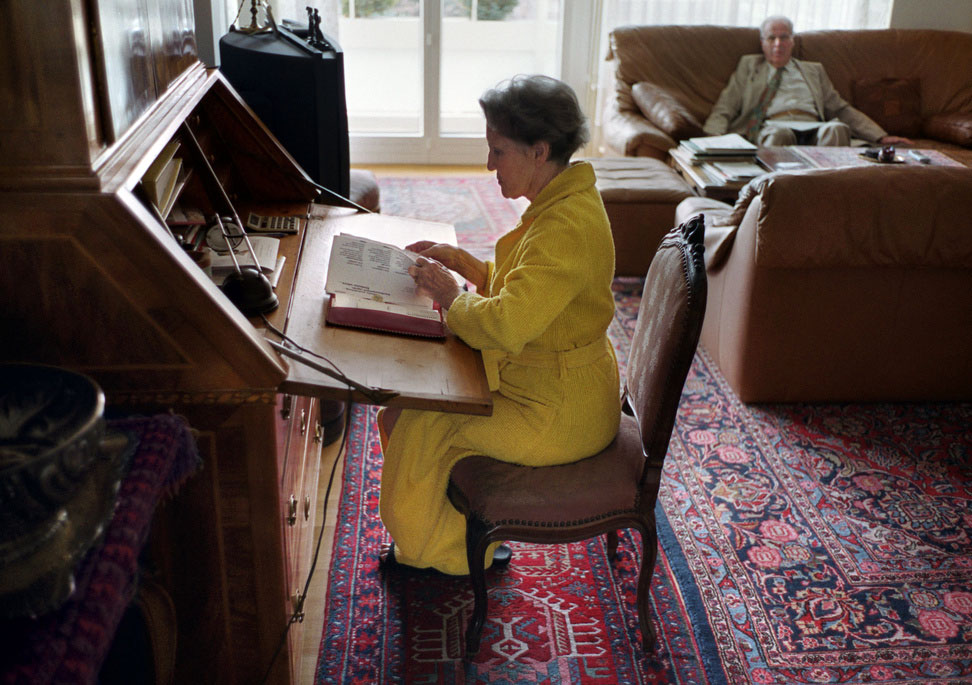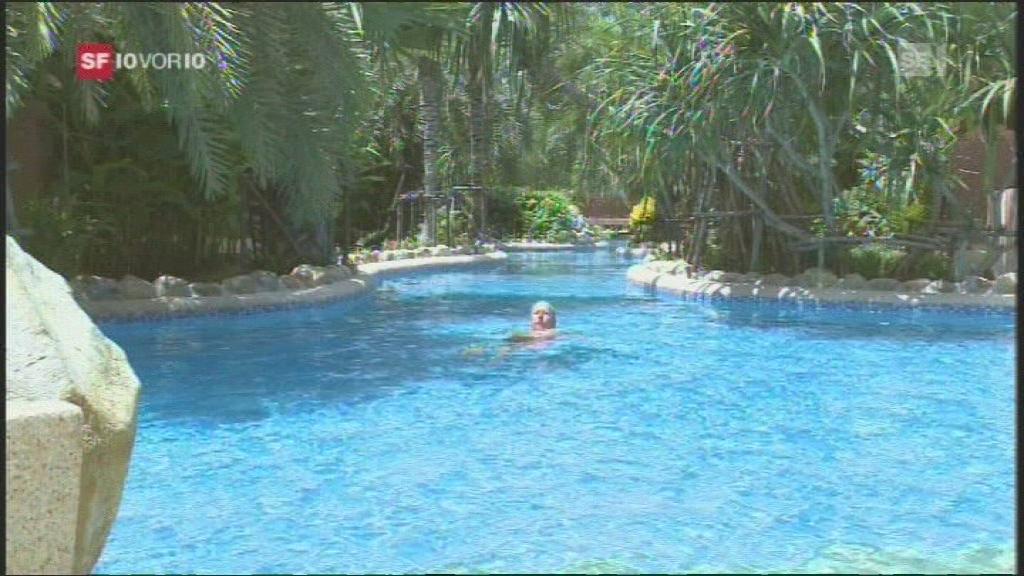Elderly immigrants enjoy taste of home

A group of pensioners of Mediterranean origin are spending their twilight years in a unique living experiment in Zurich.
Founded by the charity Alterswohnungen Albisrieden, the Oasi project combines assisted living with a southern European flair.
Its residents are offered family-style care, supervision and companionship in their native languages, while the kitchen serves up the Mediterranean fare that they have eaten their entire lives.
Signor Callipari, a resident, regales swissinfo.ch with stories of his youth in Calabria, southern Italy, his apprenticeship to a tailor in Turin and his later move to Bolzano, in southern Tirol.
For the past 45 years, he has called Switzerland home. After his wife passed away, he lived with his son for a time.
“Now I’m living with seven women and a cat,” he said.
“It’s a sweet life here, as the lone rooster in a hen house with seven women. But at 95, I can’t really crow anymore,” joked Callipari, the lone male at Oasi.
“Sometimes the women are complicated. But you know, it’s still fantastic to be surrounded by seven women.”
Like Callipari, the seven other residents are all of Italian extraction. The eighth woman, an immigrant with Spanish roots, recently passed away.
“Sometimes I’m very homesick for the place of my birth,” Callipari admitted. “But my family is here, in Oasi. I feel like this is my home.”
Modest means
The assisted living apartment was founded five years ago by the charity Alterswohnen Albisrieden, or “accommodation for the aged in Albisrieden”, a neighbourhood in Zurich.
In 2008, with demand outstripping supply, a second home for eight people, Oasi Two, was set up, also aimed at southern European immigrants who had been long-time residents of the city or canton of Zurich.
The quarters consist of a large apartment on two levels, with a living area, a kitchen, nine individual rooms, two bathrooms, two separate toilets, and an office.
Its inhabitants, who range in age from 73 to 96, tend to be of modest means, according to Oasi director Monika La Roche.
“They came to Switzerland to work – for the Swiss trains, as seamstresses, tailors, washerwomen, these kinds of jobs,” she told swissinfo.ch.
Having lived and worked in Italy for seven years, La Roche is familiar with the southern European mentality and way of life.
Mediterranean cuisine
The food is the most notable difference between a typical institution for the elderly in German-speaking Switzerland and Oasi.
“For people of Mediterranean descent, food is of central importance. And for those of advanced age, it’s even more important. A good meal makes them so happy,” La Roche said.
“Naturally, we serve Mediterranean fare at Oasi. Even so, it’s not as straightforward as you might think: northern Italians eat very differently from southern Italians. Keeping everyone happy is unbelievably complicated.”
But Signora Gianacchi, 87, had nothing but praise for the food and the personnel: “You eat well here, it’s real Italian. And they’re so nice to us.”
Fellow resident Signora Molinari, 74, agrees: “Here the atmosphere is great, and the staff are wonderful. I’m very happy. The food is good – and now and then, not so good,” she laughed.
Homesickness
Sometimes Molinari yearns for Rome, the city of her youth. However, she also realises that returning is something of a pipe dream.
“I don’t have anyone in Rome anymore,” she said.
For the past two years, she has been living at Oasi. Her married daughter lives in Zurich and visits her regularly.
“What would I do at home all day alone? Here I have companionship from morning to evening.”
Signora Figura, 74, also suffers from homesickness now and then. She grew up in Messina, Sicily, but for health reasons is no longer able to travel there.
“I came to Zurich in 1964. I got married, worked six years as a seamstress and raised three children,” she said.
“My children live in Zurich and they have their own children now. But I can’t live with my children, because I would spoil my grandchildren absolutely rotten – and my own children would not approve!” she added merrily.
Like her fellow residents, she feels very much at home at Oasi.
Caring for the aged
“Actually, we’re almost like a nursing home,” said Monika La Roche. “We care for people physically and psychologically. We have residents who suffer from dementia, but also others who would be capable of living at home with some assistance.”
But in her opinion, for avoiding loneliness and social isolation, “the kind of living situation we offer here is definitely superior”.
At 96, Signora Fabbricatore, who grew up near Naples, is the oldest Oasi resident.
“I’m very well cared for here,” she said. “In the morning the doctor will visit.”
She considers Switzerland, where she has lived for 55 years, her “second home”.
Fabbricatore keeps bringing up that, as the oldest Oasi resident, her “last trip“ draws ever nearer – “but this time, without a suitcase!” quips 95-year-old Callipari.
Wise guys
“We talk about death and dying,” La Roche said. “At those times particularly we sense a strong yearning for their birthplaces. Most of them would like to spend their last days in the place where they grew up.”
The bell rings; lunch is served. The eight residents sit together around a big table. To the right of Callipari sits Signora Figura; to his left, Signora Fabbricatore.
Callipari winks. “This is the Mafia sitting here – I represent the Calabrian mafia, Signora Fabbricatore the Neapolitan mafia and Signora Figura the Sicilian mafia…”
The project is officially known as “Oasi – Allogio assistito per anziani (Italian for “Oasis – assisted accommodation for the elderly”).
The next generation of Italian and Spanish immigrants in Switzerland speak German and would have no desire to live in a home like Oasi, according to Marianne Keller, acting head of the charity Alterswohnen Albisrieden. She told swissinfo.ch that the next generation would want something “better”, “more Swiss”.
This model of assisted living might be of use in the future for immigrants from the Balkans, for example. Much depends on future immigration patterns.
The costs are equivalent to those of other institutions for the aged in Zurich. The Oasi residents pay the costs of their lodgings, food and a portion of the supervision. Their insurance companies pay a portion of the nursing costs. The charity Alterswohnen Ablisrieden donates a set annual amount, so fees can be set relatively low. The canton of Zurich recently decided to finance the remaining deficit.
One resident, who is practically destitute, is able to live at Oasi thanks to subsidies available to long-time residents of Switzerland. In the worst case scenario, a resident’s fee would be partially reduced.
(Adapted from German by Kathleen Peters)

In compliance with the JTI standards
More: SWI swissinfo.ch certified by the Journalism Trust Initiative





You can find an overview of ongoing debates with our journalists here. Please join us!
If you want to start a conversation about a topic raised in this article or want to report factual errors, email us at english@swissinfo.ch.